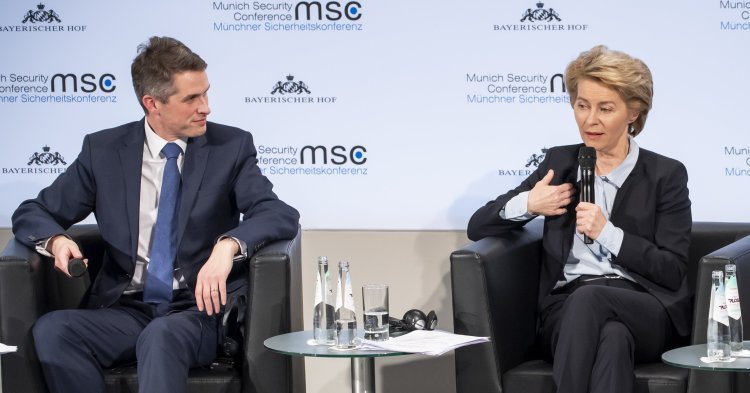At the heart of negotiations between the European Union and the United Kingdom is the impact of Brexit upon European security and defence, which is turning out to be marginal.
During the two-day conference, French Minister of Foreign Affairs Jean-Yves Le Drian spoke about Brexit’s impact on Europe’s security, arguing that “our common interests [between European and Britain] have to be taken into consideration.” The United Kingdom and the European Union, he argued, must continue to work together and develop cooperation on every level, regardless of both bilateral Franco-British initiatives and “ad-hoc coalitions that they could lead together” through NATO.
The French Minister recalled that the United Kingdom is not completely de-listed from European security strategies, mentioning in particular that 2020 marks the 10-year anniversary of the signing of the Lancaster House Treaty on Franco-British military cooperation in defence.
This reminder from France establishes itself as the necessary answer to the recent concerns regarding the future of the relationship between the UK and the EU-27. Following the UK’s referendum on 23 June 2016 , the shape of the new relationship between these two entities is still uncertain on most issues. The consequences are far-reaching for both Brussels and London, with the latter being stripped of all its powers within the Union. The negotiation period that we have been experiencing since that day emphasises the many uncertainties about the terms of divorce, and also when it comes to redefining future agreements between these two allies.
Beyond the economic, budgetary and political loss (the UK had 73 British MEP’s in the European Parliament, the 3rd largest amount after Germany and France) caused by this unprecedented departure, Brexit also raises the question of strategic and geopolitical separation: the UK is a permanent member of the UN Security Council and, alongside France, was one of the greatest nuclear powers in the European area. France will now be only country to be armed with a nuclear weapon in the EU-27, and as a result, their diplomatic and nuclear deterrent force will suffer greatly.
The promising declaration on European defence signed in 1998 by then Prime Minister, Tony Blair, promoting the EU’s “capacity for autonomous action” in security matters, and the Member States’ “collective defence commitment” seem to be irrelevant today. Since their signature, the inaction of European defence has been recognised by a great number of observers. The EU-28 have failed to launch truly coherent security policies.
Despite this partial failure, the UK’s exit from the EU will have consequences for European security, especially for Franco-British bilateral agreements in the years to come.
Legitimate fears for the future of European security
Since 2016, European leaders have expressed their fears for the influence that Brexit would have on the fight against terrorism. Jean-Yves Le Drian, then Minister for Defence under François Hollande, in a stand wrote in The Telegraph the day before the EU referendum, exhorting that “Europe will be stronger with the UK, and in turn, the UK will be safer and more influential if it stays with us.”
One month before the referendum, then UK Prime Minister David Cameron, stated that the leader of the Islamic State, al-Baghdadi, “would be glad” that Brexit would keep the UK away from the precious information exchange between the EU Member States regarding terrorist activities. Equally, European cooperation in agencies such as Europol and Eurojust will be shut off to British authorities as soon as the UK leaves the EU. Furthermore, it is also possible that some Member States may be reluctant to cooperate with the British judiciary in the future (particularly in the case of extradition of nationals).
The UK will be the biggest loser in terms of security when leaving the EU, as it will lose the many benefits provided by all the European systems in place.
Minimal consequences depending on area
Despite the new dynamic in the relations between these two entities, the United Kingdom’s status as a non-Schengen member reduces the scale of the consequences. Border controls have remained unchanged. Intelligence cooperation is mainly bilaterally and does not need a European coordination structure with non-EU countries such as the United States or Arab countries. The British therefore know that they will always be able to cooperate with the EU in this domain where international mutual aid is necessary.
From a military perspective, this departure will not turn current operations upside down: the United Kingdom has historically preferred to commit its army bilaterally or through NATO rather than under European impetus.
It has [had] little involvement in the EU’s external operations and, for example, only deployed one ship throughout the EU’s ‘Operation Atalanta’ in the Gulf of Aden against Somali pirates in 2008. Cooperation with France will continue, particularly in areas of operation such as Syria, Iraq or the Horn of Africa, where the two countries were acting independently of the Union. Furthermore, the EU authorizes non-member countries to join in its external operations, which the UK could do in the future if it so desires.
Owning to its historical presence in NATO, the United Kingdom also maintains strong political alliances with NATO member states on security issues. The Secretary General of NATO, Jens Stoltenberg, affirmed after the referendum results that “The UK will remain a strong and committed ally and NATO member State, and will continue to play its leading role within our Alliance,” highlighting that London’s position in NATO “will not change.”
In reality, therefore, it is not European defence that will suffer most from Brexit, but rather political cooperation in the area. The EU remains a major global player in international peacekeeping, and Brexit will not undermine its credibility. Rather, it is the restructuring of a common strategy and the promotion of a single voice that the EU must focus on in order to remain at the top of international relations.

Follow the comments: |
|
